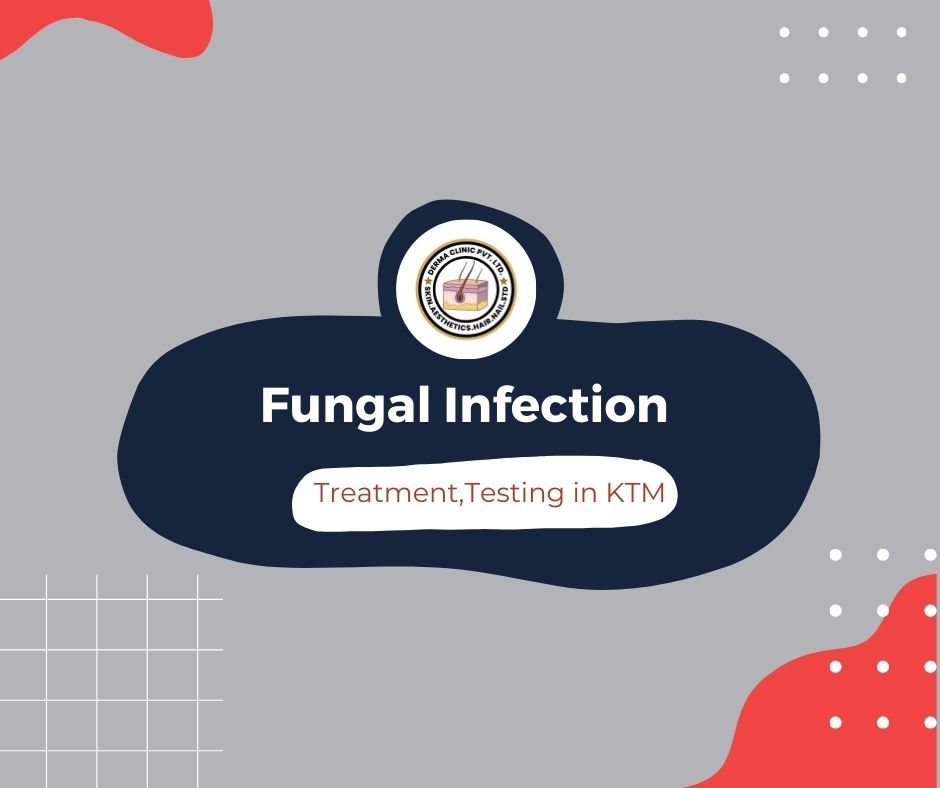Fungal skin infections are a significant health concern in Nepal, with dermatophytosis being particularly prevalent. Derma Clinic Kathmandu, like other dermatology centers in Nepal, plays a crucial role in diagnosing and managing these conditions.
Prevalence and Common Types in Nepal:
- High Burden: Superficial fungal infections, especially dermatophytosis (ringworm), are very common in Nepal, making up a significant portion of dermatology outpatient visits.
- Common Infections: Similar to global trends, common skin fungal infections in Nepal include:
- Tinea pedis (Athlete’s foot)
- Tinea cruris (Jock itch)
- Tinea corporis (Ringworm of the body)
- Tinea capitis (Ringworm of the scalp)
- Onychomycosis (Nail fungus)
- Cutaneous Candidiasis
Diagnostic Tests Available in Nepal, Including at Clinics like Derma Clinic Kathmandu:
Accurate diagnosis is the first step to effective treatment. Clinics like Derma Clinic Kathmandu in Kathmandu would typically offer the following diagnostic tests:
- Clinical Examination: Dermatologists at Derma Clinic Kathmandu would initially perform a thorough visual examination of the skin lesions to assess the type and extent of the fungal infection.
- Potassium Hydroxide (KOH) Examination: This is a rapid and widely used test in Nepal. Derma Clinic Kathmandu would likely perform KOH exams in-house. Skin scrapings are examined under a microscope after KOH preparation to detect fungal elements.
- Fungal Culture: When specific fungal identification is needed, Derma Clinic Kathmandu is only Clinic in Nepal to offer fungal culture in its premises. Culture helps identify the exact fungus, guiding targeted treatment.
- Wood’s Lamp Examination: Derma Clinic Kathmandu may use a Wood’s lamp to help diagnose certain scalp and Pityriasis versicolor infections, as these fluoresce under UV light.
- Other Tests: For Reccurent fungal infections and to prescribe oral antifungal some Basic blood test need to be done like: CBC,Liver Function test – LFT ,Sugar,Kidney Function Test – KFT, HIV, Thyroid test and others when needed.
Treatment Options at Derma Clinic Kathmandu and in Nepal:
Treatment strategies in Nepal, including at clinics like Derma Clinic Kathmandu, are aligned with global guidelines and include both topical and oral medications:
- Topical Antifungal Medications: For many superficial skin fungal infections, topical treatments are the mainstay. Derma Clinic Kathmandu would prescribe or recommend various topical antifungals, including:
- Azole creams: Clotrimazole, miconazole, ketoconazole,Luliconazole creams are widely available in Nepal and likely offered at Derma Clinic Kathmandu.
- Allylamine creams: Terbinafine cream is also commonly used and available.
- Ciclopirox cream/lotion
- Antifungal shampoos: Ketoconazole or selenium sulfide shampoos for scalp and Pityriasis versicolor infections.
- Oral Antifungal Medications: For extensive, severe, or nail infections, oral antifungals are necessary. Derma Clinic Kathmandu would prescribe oral medications when needed, such as:
- Terbinafine tablets: Commonly used for nail and dermatophyte infections.
- Fluconazole or Itraconazole capsules: Azole antifungals for broader spectrum coverage.
- Griseofulvin: Less frequently used now, but may be considered for tinea capitis in children if other options are not suitable or available.
Combination Oral Treatment:
- In some severe or resistant fungal infections, particularly onychomycosis, dermatologists at Derma Clinic Kathmandu might consider combination oral antifungal therapy. This could involve combining different classes of oral antifungals to enhance efficacy and combat resistance. However, combination therapy is generally reserved for complex cases due to potential side effects and drug interactions.
Recurrent Fungal Infections:
- Common Issue: Recurrence of fungal skin infections is a common problem in Nepal and globally. Factors contributing to recurrence include:
- Incomplete Treatment: Stopping medication too early.
- Re-exposure: Contact with fungal spores in the environment, from family members, or pets.
- Underlying Predisposing Factors: Conditions like diabetes, hyperhidrosis (excessive sweating), or weakened immunity.
- Management: Derma Clinic Kathmandu would emphasize preventive measures to minimize recurrence, such as:
- Completing the full course of prescribed medication.
- Maintaining good hygiene: Keeping skin clean and dry, especially in folds.
- Wearing breathable clothing and footwear.
- Avoiding sharing personal items.
- Addressing underlying predisposing factors if possible.
- For frequent recurrences, maintenance therapy with topical or oral antifungals might be considered under specialist guidance at Derma Clinic Kathmandu.
Important Considerations for Nepal:
- Accessibility and Affordability: Access to specialized dermatology clinics like Derma Clinic Kathmandu might be limited in rural areas of Nepal. Affordability of medications, especially oral antifungals, can also be a concern for some patients.
- Public Health Awareness: Raising public awareness about fungal skin infections, hygiene practices, and the importance of seeking timely and appropriate treatment remains crucial in Nepal.
For specific treatment advice and diagnosis, it is always best to consult with a dermatologist at a reputable clinic like Derma Clinic Kathmandu or another qualified healthcare provider in Nepal. They can provide personalized recommendations based on your individual condition and circumstances.Do not visit pharmacy for fungal infection treatment visit Dermatologist for better treatment outcome.

